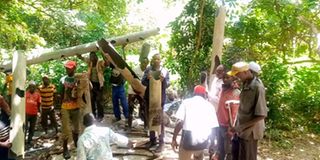Residents clash with KWS over water from Meru National Park

Farmers of Kindani, Igembe South in Meru assess damage caused on a water intake at the Meru national park.
Residents of Kindani, Igembe South, Meru County, have accused Kenya Wildlife Service (KWS) officers of dismantling a water intake for eight community projects.
Officials overseeing the projects said equipment worth over Sh10 million was destroyed when KWS rangers disconnected water pipes and valves at a well in the park last Friday. They threatened to sue the KWS for compensation.
The clash was the culmination of competition for water resources brought about by drought that has left most rivers in Meru County dry.
Mr Atanasiu Mugambi, secretary of the Kindani water project, said residents had gone without water for four days and called for intervention from the county and national governments to resolve the matter.
“The projects were installed by 1,500 members benefiting over 20,000 people and we were shocked when KWS destroyed our equipment without notice, which is illegal. We demand that they compensate us, otherwise we will go to court to seek redress,” Mr Mugambi said.

Pipes that were destroyed at a water intake at Meru National Park.
“The intake has been there for 10 years and we have all the relevant permits … they did not have the legal basis to invade our property.”
Mr Julius Kobia, the area assistant chief, said they met with KWS officers last week and agreed to convene a stakeholder’s forum where all groups would be represented, only for the agency to take the action before the meeting was held.
“Because water is scarce due to the drought, we had agreed that residents will use it at night while we release water for use by animals at the park during the day but they did not wait for the meeting in which we were to agree on the modalities,” Mr Kobia said.
The Kianda-Thaichu conservation group called for the wildlife agency to balance between saving animals and human beings who were starving, adding that crops were drying up while there was no water for domestic use

A water intake at Meru National Park that was destroyed.
“In 2018, when there was drought, we agreed on how to share the little water we had, but I don’t know what happened this time round,” said Timothy Livondo, the group chairman.
“Even as they seek to save wild animals whose importance we appreciate, they should know we are also suffering.”
But KWS said farmers had refused to ration water, leading to the drying up of four rivers in the park, and failed to adhere to a rationing plan that would see some water released to the park for wild animals.
“We cannot leave animals to die, so we had to restore water in the park. But we did not destroy the equipment as they allege,” said a KWS officer, who spoke on the condition of anonymity.





